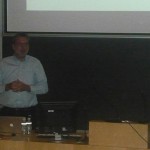EU’s crisis strategy: Gold on paper, bronze in reality

Once, a long time ago, Muslim armies had spread and conquered lands as far as Spain and India. Their religion had traveled even farther than that, going into the Far East and Southeast Asia. Muslim scientists and mathematicians have led the world to new discoveries. But what propels the mechanisms behind the Islamic State is not the power it used to have, but rather the loss of it.
The threat
The image that ISIS casts, with its radical no toleration policies and extreme punishments, is that of a group driven by grievance and motivated by an utter desire of equivalence to that of current global power-states.
What makes the group appear so united is similar, if not identical, to Adolf Hitler’s reliance on the created image of an Aryan race, superior and unique at the same time. Being part of this exclusivist group offered members a sense of belonging, of justice and entitlement.
“One year into the crisis and we see EU nations backing down on human rights support, building up wire fences, applying numerous border restrictions and, most painfully, refusing to deal with the situation created in their own backyards.“
The reaction
The result however is split into 2 streams: the western stream is characterized by intense Islamophobia, while the oriental stream is overruled by fear. The latter has already forced millions to become refugees in what is the biggest mass population movement since World War II.
We might not be able to see the entire picture at this moment, but the structure of a grimmer future is becoming more visible as westerners are making refugees the scapegoats for acts of terrorism carried out by Muslims, and governments have begun to reconsider some of the most basic human rights that the world has fought for entire decades.
The Human Rights Watch discloses in its World Report 2016 how multiple governmental entities, especially the ones who have been longtime human rights advocates, are now threatening to increase security measures within civil society. As previously seen in the 9/11 case, increasing homeland security meant that government authorities gained the right to breach a person’s rights without previous disclosure of any suspicion evidence.
The results
So far, political and social turmoil have isolated the following tendencies:
– Islamophobia;
– Massive population migration;
– Re-evaluation of human rights;
– Social distress among discriminated EU minorities

These tendencies are not necessarily recent, but they are definitely more pronounced now than they had been 3 years ago. They are also inter-connected and dependent upon each other.
The EU, once a seemingly tied entity, has been showing its weaker angles for years now. However, the current situation is not just triggering blind spots, but it’s making the EU’s entire structure tremble.
One year into the crisis and we see EU nations backing down on human rights support, building up wire fences, applying numerous border restrictions and, most painfully, refusing to deal with the situation created in their own backyards.
In 2015, the EU has offered Turkey €3 billion financial aid, with the condition that the latter refrains the immigration flow. It may appear that too long a time has passed since the European people have fled Nazism and Communism and when millions sought refuge themselves.
And, surely enough, open discrimination coming from public figures has opened the gateway to entire communities making refugees the scapegoats for the condemnable actions of one group. Though this may not be news, it is the exact principle that terrorist groups rely on to sign up new recruits. Entire communities now feel vilified, so it is only natural that they would seek refuge with their own.
Bringing the case of 9/11 into light again, the USA confronted massive judgmental accusations regarding their treatment of so-called suspects and their discriminatory approach. However, here we are, a little over a decade later, and the EU reacts much the same way, without being able to make the connections.
“You do not have to be a political prodigy to realize that discrimination does not represent a practical counter-terrorism strategy.“
The EU’s strategy is failing and decision-making is stupendously slow, now when the current situation requires a major task-force solution. In January of this year, the EU’s new strategy managed to relocate a mere 331 refugees, out of an estimated 160,000, according to the Politico magazine.
In the meantime, the EU Commission finds it difficult to prioritize an already chaotic process and chose to first re-consider the European Border and Coast Guard regulations, instead of focusing on relocation. However, deadlines have been repeatedly missed, as this March has seen another month pass by without any clear directions being taken.
Nonetheless, securing the European Border and Coast Guard’s strategy should allow refugees to reach Europe in an orderly risk-free fashion, as opposed to chaotically entering the territory while being exposed to risks of death and malnutrition and also enriching smugglers. The Commission’s strategy so far seems to be more focused on keeping immigrants out or re-directing them to other nations to be relocated.

The rise of mass surveillance
The massive inflow of immigrants taken by Europe, topped by the recent terrorists attacks in the continent’s most prominent capital cities (Paris and Brussels) have increased the general population’s need for an intensely more secure environment.
And so, here we are today, seeing new mass surveillance policies being openly greeted, in both France and the UK.
Police forces are also to receive increased budgets. In France, president Hollande has assigned 8,500 more law enforcement officers, following the December attacks, which included people the law forces had been aware of, but did not follow up on the leads, due to lack of resources.
Image sources:

Tags: Crisis Management, European Union, Strategy




